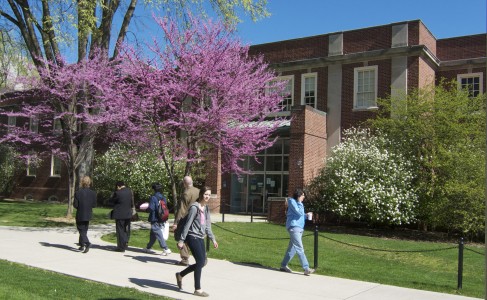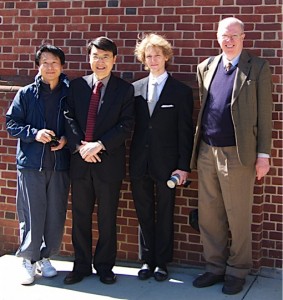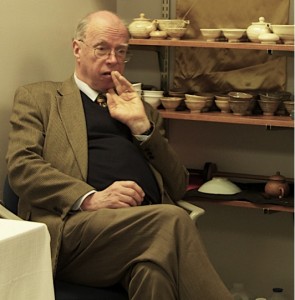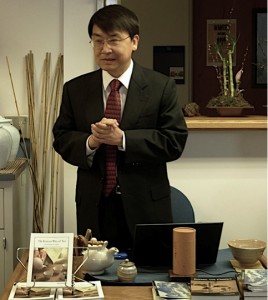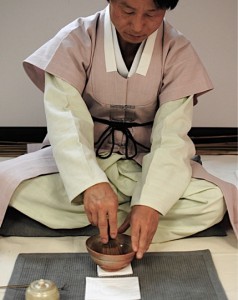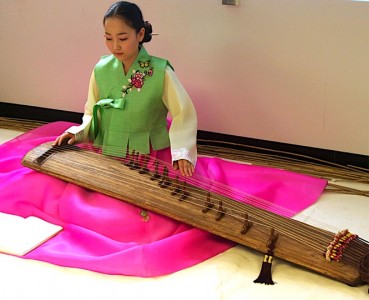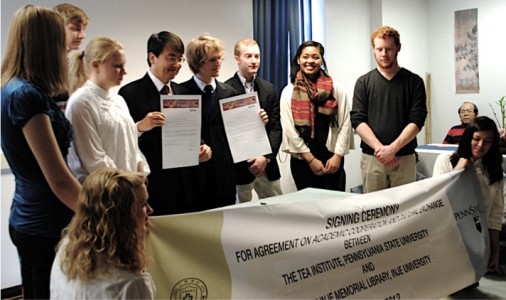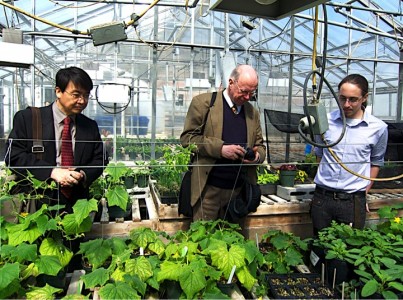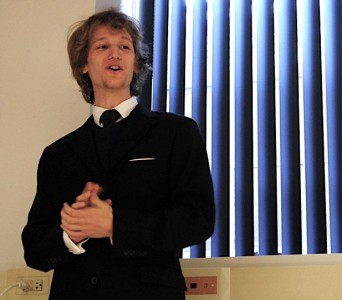Report on the 2012 Korean Tea Exhibition at Penn State
The Tea Institute of Pennsylvania State University recently hosted an extraordinary gathering devoted to the art of Korean tea. In a series of events held in early April 2012, the Institute presented a comprehensive program on the history, culture, practice, and music of tea. Specialists were invited from Korea and America to present lectures and demonstrations as well as to conduct master classes. Fine tea, exquisite performances, and the latest scholarship were offered over four days. The events drew an enthusiastic crowd from the students and faculty at The Pennsylvania State University, the community of the town of State College, and the public at large.
Founded in 2010, the Tea Institute is dedicated to the study and preservation of all tea ceremony. In 2011, the Institute organized an extensive schedule of events on Chinese tea. The 2012 Korean Tea Exhibition was the second such program presented by the Institute to advance the broader understanding of traditional tea culture. All events were held at The Penn State Tea House in the Ritenour Building on the University Park Campus of Pennsylvania State University.
Brother Anthony of Taizé gave the keynote address in an illustrated lecture entitled “The Full History of Korean Tea.” Known throughout Korea as An Sonjae and the foremost translator of modern and contemporary Korean poetry, Brother Anthony is Professor Emeritus at Sogang University. In his presentation, he revealed the long and intricate history of Korean tea in a lecture that drew heavily on his latest research into the revival of tea culture during the late Joseon dynasty.
At the University Club, he gave an insightful commentary on his books The Korean Way of Tea: An Introductory Guide (2007) and Korean Tea Classics by Hanjae Yi Mok and the Venerable Cho-ui (2010). Brother Anthony also presented an illustrated lecture entitled “Korean Tea Production and Brewing” which described the handcrafting of rare tea picked each spring from wild plants shaded by bamboo on the slopes of Mount Jiri in South Jeolla province. He explained, moreover, the procedures and methods of brewing as demonstrated by Mr. Hong Kyeong-Hee, tea master in the Hyodang tradition.
Dr. Jae-Sup Park of Inje University gave two illustrated lectures: “Korean Tea Culture” and “Korean Art,” which provided historical and art historical perspectives on tea. Professor Park is Director of the Korean Culture Institute and the Paik Inje Memorial Library as well as head of Inje University’s Center for Korean Language and Culture. As a teacher of tea, Dr. Park offered an illuminating perspective on the impact of tea on Korean culture through its art, literature, and music. He illustrated his talks with striking images of beautiful Korean art and recordings of traditional compositions for flute and zither.
Mr. Hong Kyeong-Hee of Inje University and the Panyaro Institute for the Way of Tea prepared and served tea throughout the program. Known by his tea name Master Hyo-am, he performed the Korean tea ceremony, brewing steeped tea with customary ceramic wares. Mr. Hong taught a number of master classes to members of the Tea Institute and demonstrated the toasting and boiling of tteok-cha, Korean caked tea. Among the teas prepared and brewed by him, Mr. Hong served a chrysanthemum tea – the blossoms picked from his own garden. He also served traditional tea sweets, which he made especially for the gathering. For the final event, Master Hyo-am, dressed in traditional robes, served a powdered green tea laced with red ginseng, whisked to a fine, light froth; he performed while accompanied by music on the zither played by Ms. Eun Sun Jung.
Ms. Jung performed traditional music composed for the gayageum, the Korean zither. An award winning musician, Eun Sun Jung is a member of Geumam, an organization dedicated to the preservation of Korean traditional music. She also performs with Janya, a quartet that composes and records contemporary music. Attired in bright traditional robes, she made a stunning entrance carrying the long, paulownia wood zither. During the tea performance, she accompanied Master Hyo-am, playing in harmony with his movements, her resonant notes deepening the meditative mood of the ceremony.
Steven D. Owyoung presented two illustrated lectures entitled “A History of Tea in China” and “Lu Yü’s Chajing: Translation and Insights.” Owyoung is an art historian and translator of Chinese literature and poetry. His talks provided the cultural context for the development of Korean tea, citing the exchange of embassies, tribute, scholars, and tea between Korea and China throughout history. His lecture on the Chajing was based on his unpublished translation of the Tang Book of Tea and its contents.
In addition to the lectures and performances, the Institute collaborated with the Edwin W. Zoller Gallery, which exhibited ceramic teacups and mugs produced by students in the School of Visual Arts. Most importantly, in a ceremony attended by its Chairs, Dr. John Yen and Dr. Liz Jenkins, The Tea Institute at Penn State signed an Article of Mutual Understanding with the Paik Inje Memorial Library of Inje University, initiating the Institute’s Experimental Learning Program in Korea for summer 2012. Through this one-month program, five Institute members will travel to Korea to study tea, culture, and history, as well as ceramic tea wares.
During the event, the Institute gave a tour of the University Park Campus, which was in full, spring bloom under clear skies. Included on the walk was a visit to the hot houses where the Institute conducts the growing of tea plants. As an interdisciplinary research organization, the Tea Institute encourages its members to engage in the study of tea culture through the arts and sciences. The plant specimens will contribute to a horticultural investigation and the attempt to determine when Korean tea split from the Chinese botanical line by using phylogenic analysis and classification. Other studies include: the examination of volatile aromatics to establish chemical indicators of quality through statistical analysis and data mining; and an investigation of how cultural preference in taste and flavors effect production methods in the manufacture of tea.
The Institute is led by Jason M. Cohen, founder and Executive Director. Under his effective leadership, Cohen has built an impressive organization closely connected to the University, faculty, and students. He is ably assisted by Pat Penny, Director of Operations, and Gabrielle Parker, Director of Marketing. Together with their members, they administer and run a multifaceted program of which the Penn State Tea House is a major feature.
Housed in a suite of rooms in the Ritenour Building, the Tea House offers Chinese, Korean, and Japanese tea brewed and served according to traditional methods: gongfu, Panyaro, and chanoyu. The rooms house the Institute’s collection of ceramic wares, tetsubin, spring water, as well as its ever increasing inventory of fine and rare teas. The Tea House is also the meeting place for the lectures and practice sessions of the Chinese, Korean, and Japanese tea ceremony clubs.
Only in its second year of being, the Tea Institute at Penn State promises to advance the science and modern appreciation of tea while perpetuating the leaf’s most traditional methods. By any measure, the program is succeeding. Jason Cohen and the Institute members provided an exemplary presentation of tea, and they were roundly congratulated by all for their uncommon dedication to the leaf, especially the exceptional and beautiful custom of tea Koreana.
The Penn State Tea House
34 Ritenour Building
Pennsylvania State University
University Park, PA 16802
Phone: 305/747-1238
Email: TEA.PSU@gmail.com
Website: http://twitter.com/PSUTeaHouse

